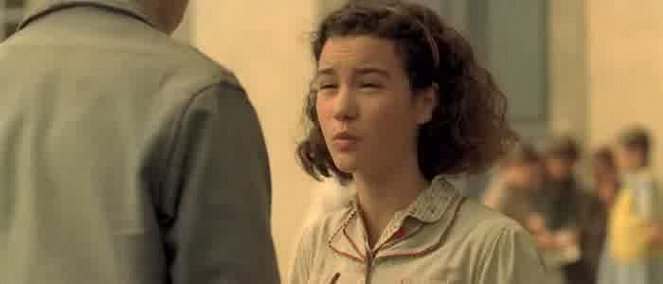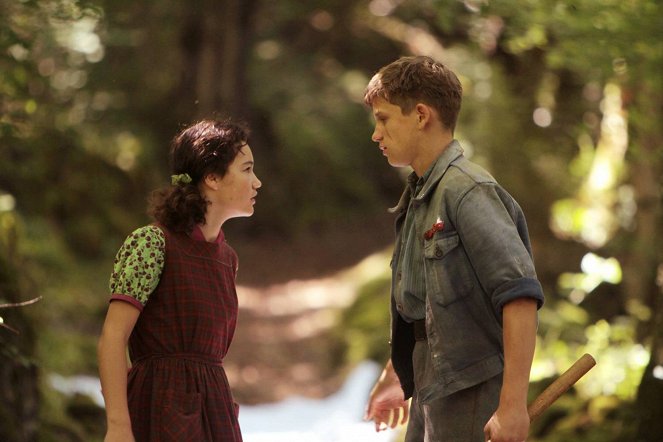Regie:
Christophe BarratierDrehbuch:
Christophe BarratierMusik:
Philippe RombiBesetzung:
Laetitia Casta, Guillaume Canet, Jean Texier, Kad Merad, Gérard Jugnot, François Morel, Ilona Bachelier, Marie Bunel, Clément Godefroy, Grégory Gatignol (mehr)Inhalte(1)
Schon immer bekämpfen sich die Kinder der Nachbardörfer Longueverne und Velrans ohne Gnade. Doch die Beschimpfung als „Weicheier" durch die Velraner können sich die Longueverner nicht gefallen lassen – das bedeutet Krieg! Der Anführer der Longueverner, Lebrac (Jean Texier), ersinnt eine besondere Kriegslist: Den Gefangenen werden alle Knöpfe ihrer Kleidung abgeschnitten – besiegt und gedemütigt ist ihnen der Ärger zu Hause sicher und die Kämpfe haben nunmehr einen Namen: der „Krieg der Knöpfe". Doch als der wahre Krieg 1944 auch nicht vor dem kleinen französischen Dorf halt macht, verbünden sich Kinder und Erwachsene und stehen gemeinsam auf der richtigen Seite ...Die fesselnde Abenteuergeschichte erzählt von Freunden und Feinden, vom Siegen und Verlieren, von kleinen und großen Kindern. (EuroVideo Media)
(mehr)Videos (1)
Kritiken (3)
Ich habe seit langer Zeit keine Adaption mehr gesehen, die in jeglicher Hinsicht neben der Kappe wäre. Barratier hat sich hier unsinnigerweise für eine vollkommen pastellfarbige Hyper-Kitsch-Form entschieden, welche ein aus eine, Jungenspiel irgendeine Art von erhobenem infantilen Kriegsdrama macht - aber hierdurch verliert die Geschichte all ihre Poesie, Verspieltheit und zum Schmunzeln bringende Spannung zwischen kleinen Taten sowie ihren "großen" Resonanzen in der Jungengemeinschaft. Pergauds Buch beinhaltet die Essenz kindlichen Neckens mit all ihrer Unverbindlichkeit und scheut dennoch die Verantwortung nicht - diese ereilt beide Hauptakteure in einem großartigen und nicht gerade "sonnenscheindurchtränktem" Ende. Doch Barratier hat das Buch umgepflügt, sowohl Teile der Geschichte, als auch die Charaktere über die gesamte Filmlänge lässig verteilt (so dass sie nicht viel Sinn ergeben) und sie mit einer leblosen Ideologie verknüpft: Es ist nicht mehr nur ein Spiel, sondern man denkt hier über Heldentum, Widerstand, Republik, Rasse nach ... und Leider ist Der Krieg der Knöpfe der langweiligste Lehrer und Rhetor - wahrscheinlich auch aufgrund des Synchronsprechens, welches die krampfhafte Dialoge noch in Richtung theatralischer Deklamation verlagert. Ich weiß nicht, warum eine simple Geschichte über Jungs, die von kleinem Gezänk zu einem echten Konflikt hinübergehen, durch edle Motive des Judentums, des Trotzes sowie der entgangenen Liebe ergänzt werden sollte. Besonders wenn´s in dieser thesenartigen und leblosen Form geschieht. Die gezwungen wirkende "Belehrung" des Films wäre ja noch erträglich, wenn der Streifen zumindest durch eine gut erzählte Geschichte, starke Charaktere und hochwertige Handwerkskunst ausgeglichen werden würde. Aber Der Krieg der Knöpfe ist schlicht und einfach ein ekelhafter Kitsch, der nicht einmal ein Zehntel der Emotionen und Botschaften des Originals zu vermitteln vermag - eine bewundernswerte Tatsache ist, wie der ursprüngliche auslachend Ton hin zur Erwachsenenwelt den Film zur oberflächlichsten patriotischen Agitation über den französischen Widerstand macht (da soll mir keiner böse sein, doch dies hat wohl den gleichen informativen Wert wie 'Allo 'Allo! . Yves Roberts großartiger Film aus dem Jahr 1962 bleibt mit seinem zivilen Ton, dem Witz und der jungenhaften Begeisterung unantastbar - all die "Pseudoerwachsenen" -Kompositionen oder die grässlich aufdringliche Musik der neuen Version klingen wie ein sehr mieser erzieherischer Witz. Alle Knöpfe wegschneiden und draufurinieren: Enterhte Kindheitsidole vergebe ich nicht!
()
To avoid staying only across the pond or on the British Isles, this time we will look to France with another film, straight to one of the greatest classics. "The War of the Buttons" is a book that is well known by children and adults not only in France, but also in other countries in Europe and perhaps even around the world. Yes, we know it in the Czech Republic as well. I saw it a long time ago and didn't remember much from it, so I didn't mind watching the new version. It's new because it also has a French original title. We were satisfied with it just being another "War of the Buttons". The French title, which includes "nouvelle", comes from two facts. The first one is purely pragmatic - in 2011, two films based on a well-known book were released. Both are a bit different in terms of where and when the story takes place. The first one kept the original title "La guerre des boutons", the second adaptation, which I want to talk about today, has that "nouvelle" to differentiate itself. We don't really care, the version I'm reviewing today is the one that got wider distribution. Now, the second reason for "nouvelle". It is also because the original plot was taken and adapted to a different time. The book was written in 1912, so it couldn't emphasize any of the great wars, although it sort of did, of course, long after its release and after the experiences with the wars. The creators of the film "The War of the Buttons" realized this and did nothing else but connected the war about buttons to the war about Europe. Yes, the period is World War II and German penetration into France. We are dealing with fascists here, but it's still mainly about children and their war. I must say that the children don't have to envy the adults, they conduct their war excellently, although of course it's not about bloody battles. There are low blows, power plays, when a group attacks one person, there are traitors, and in the end, revenge. It shouldn't be a children's film though, so that it doesn't end well in the end. The war connection is a bit extra, but it also helped create touching and emotional moments, which the film wouldn't lack in the end. "The War of the Buttons" ultimately ends very quickly, in order to address bigger problems. Love prevails and helps end the war, or at least that's the message. More: http://www.filmovy-denik.cz/2013/02/now-is-good-stand-up-guys-bourne-30.html
()
Unfortunately, I do not remember the original version of this title, so I cannot authoritatively compare the qualities of both films, but it seems to me that it is a decent work with a decent budget and reasonable technical aspects. The only thing that bothers me is that it tries to be too serious and has an oppressive atmosphere with the threat of Jewish transports, interventions by collaborating authorities, and the ever-present threat of war. The boys' rivalry and the comedic aspect of the story are actually in the background. Furthermore, the film excessively plays on the de Gaulle legend of France fighting and unified against the enemy. The whole town beautifully unites in an effort to help a Jewish girl avoid arrest. The reality was much more complicated and far from idyllic. The support of Vichy France was far from insignificant, and anti-Semitism was deeply rooted in French society. This is more of an educational and idealizing film, but it does not have any significant flaws and is quite likable. Personally, I prefer more humorous categories of films about children, such as the French film Little Nicholas. Overall impression: 70%. In any case, the camera and excellent musical component deserve recognition.
()



Werbung